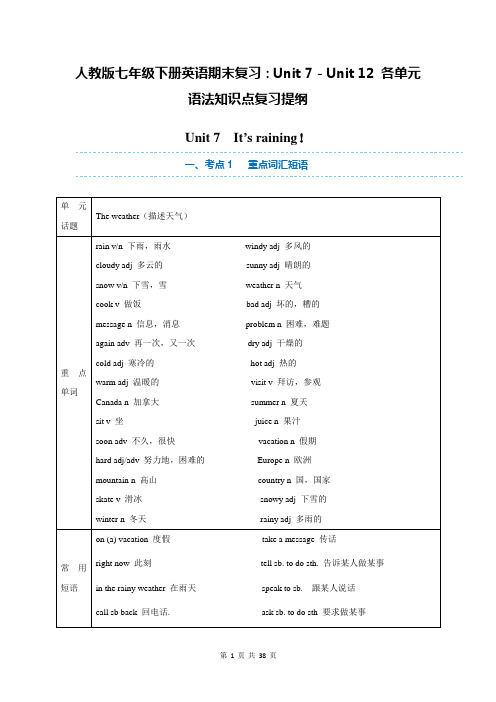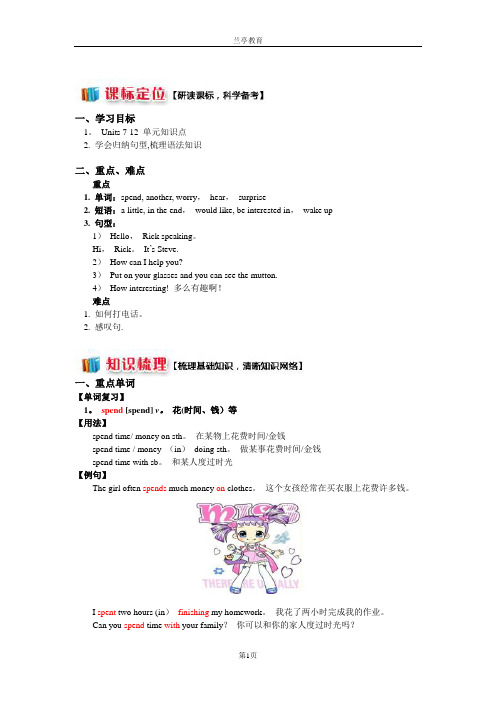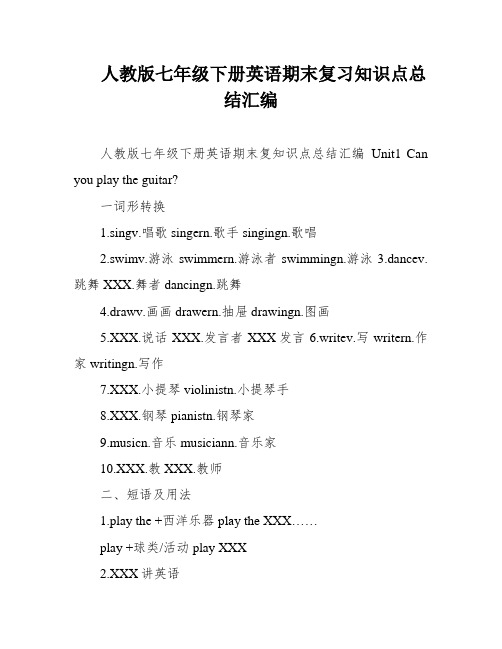人教版七年级英语下册期末复习资料
人教版七年级下册英语期末复习:Unit 7-Unit 12 各单元语法知识点复习提纲(全面!)

人教版七年级下册英语期末复习:Unit 7-Unit 12 各单元语法知识点复习提纲Unit 7 It’s raining!一、考点1 重点词汇短语1 messagemessage为可数名词,意为“消息,信息”,take a message for sb.“为某人捎个口信”。
拓展:give sb. a message 捎信给某人,leave a message 留口信,get the message 明白对方的意思。
Can I take a message for him?当某人发现要找的人不在或接电话的人发现打电话者要找的人不在时,常用此语2 could 情态动词意为“能,可以“,表示请求许可,在语气上比can委婉客气,但这种句式的肯定回答用can。
Could you just tell him to call me back?3 call及物动词,意为“打电话给”。
call sb. (up) “打电话给某人”,call sb. at +电话号码,意为“拨打……找某人”。
拓展:call 是一个多义词,call sb 可表示“叫醒某人,呼唤某人”;give sb. a call 给某人打电话。
4 back副词“回来,回原处,向后”;call sb. back给某人回个电话。
【即学即练】I’ll _____you _____.我将给你回电话。
5 visit此处用作及物动词,意为“拜访,探望”,后接表示人的名词或代词。
visit还可意为“参观,游览”,后接表示地点的名词。
拓展:visit还可用作可数名词,意为“访问,参观,拜访。
be on a visit to ... “正在访问/参观……”。
visitor参观者,游览者,游客。
I’m having a great time visiting my aunt in Canada._____ my grandparents every year at Christmas.我每年圣诞节都去探望我的祖父母。
七年级英语人教版(新目标)(最新版)下学期期末复习:知识点归纳

一、学习目标1。
Units 7-12 单元知识点2. 学会归纳句型,梳理语法知识二、重点、难点重点1. 单词:spend, another, worry,hear,surprise2. 短语:a little, in the end,would like, be interested in,wake up3. 句型:1)Hello,Rick speaking。
Hi,Rick。
It’s Steve.2)How can I help you?3)Put on your glasses and you can see the mutton.4)How interesting! 多么有趣啊!难点1. 如何打电话。
2. 感叹句.一、重点单词【单词复习】1。
spend [spend] v。
花(时间、钱)等【用法】spend time/ money on sth。
在某物上花费时间/金钱spend time / money (in)doing sth。
做某事花费时间/金钱spend time with sb。
和某人度过时光【例句】The girl often spends much money on clothes。
这个女孩经常在买衣服上花费许多钱。
I spent two hours (in)finishing my homework。
我花了两小时完成我的作业。
Can you spend time with your family?你可以和你的家人度过时光吗?【拓展】(1) pay常用来表示“付款”,主语是人,其后用介词for。
sb。
pays money for sth. = sb。
spends money on/ doing sth。
(2)cost 表示“花钱”,主语为物。
sth。
costs sb. money. = sb. pays money for sth。
= sb。
spends money on/(in)doing sth。
人教版七年级英语(下册)期末专题复习——词汇

D. beautiful quite a
19. Old Mr. Green doesn't feel ____C____ because some
students visit him regularly.
【2018•上海】
A. sadly B. gently C. lonely D. angrily
A. bedroom
B. classroom
C. lab
D. kitchen
13. You're new here and it's ____A____ of you to bring a map. A. smart B. strict C. beautiful D. true
14. —Helen, don't ___C_____to come here before 6: 30.
21. This watch is too expensive. I want to buy a ____C____ one. A. expensive B. old C. cheap D. bad
【点拨】前面提到“这块手表太贵。”从而可判断 “我想买一个便宜的。”故选C。
22. I don't like my sister's ____B____ because they're
【点拨】句意为“老格林先生并不感到孤独,因为一 些学生经常去看望他”。根据句意并运用逻辑推断可 知,经常有学生来探望,那一定是不感到孤独,故选 C。
20. Singing English songs is ____B____our English study.
A. good at
B. good for
期末复习人教版英语七年级下册单元重点知识点语法汇总

人教版七年级下册-单元重点语法汇总U1情态动词can的用法can是情态动词,意为“能,会”,表示某人或某物具备的能力,还可用来提出请求,没有人称和数的变化,后面直接接动词原形。
下面学习情态动词can的常见用法。
1.表示“能力”,意为“能,会”。
例句:I can speak English.我会讲英语。
2.表示“请求”或“许可”。
例句:Can you help me with my Chinese?你能帮我学汉语吗?You can go to the park after you finish your homework.你做完作业后可以去公园。
3.含有情态动词can的肯定句变否定句时,需在can后加not,其缩写形式为can’t;变疑问句时,情态动词can直接放在句首,构成一般疑问句。
例句:I can sing English songs.我会唱英文歌。
(肯定句)→I can’t sing English songs.我不会唱英文歌。
(否定句)Yao Ming can play basketball.姚明会打篮球。
→Can Yao Ming play basketball?姚明会打篮球吗?(一般疑问句)4.对Can…问句的回答可以用下面几种形式:对询问能力的问句的回答可以说“Yes,…can.”或“No,…can’t.”,表示对能力的肯定或否定;对表示请求的问句的回答可以说“OK./All right.”,表示同意对方的请求。
也可用certainly或sorry来回答。
用certainly作肯定回答,语气更肯定;用sorry作否定回答,语气则更委婉、客气。
例句:—Can you speak English?你会说英语吗?—Yes,I can.是的,我会。
—Can I see your pencil-box,please?请问,我可以看一下你的铅笔盒吗?—All right./Certainly.Here you are.可以。
人教版七年级下册英语期末总复习资料

人教版七年级下册英语期末总复习资料对于七年级的学生来说,要掌握一些英语的知识点,才能更好地提高英语成绩。
以下是小编给你推荐的七年级下册英语期末总复习资料,希望对你有帮助!人教版七年级下册英语期末总复习资料一第一单元词组1. Play the guitar 弹吉他2. what to do sth 想做某事3. join the music club 加入俱乐部4. speak English 说英语5. match----with 与------匹配6. play chess 下棋7. the swimming club 游泳俱乐部 8. what club 什么俱乐部9. a sports club 一个体育俱乐部 10. be good at telling stories 擅长讲故事11. the story telling club 讲故事俱乐部 12. like to do/doing 喜欢做某事13. let’s join 让我们加入 14. sounds good 听起来好15. students wanted for School Show学校表演招聘学生16. talk to /with跟某人谈话 17. after school 放学后 18. do kung fu 表演功夫19. show sb sth=show sth to sb把某物展示某人 23. have fun doing 做事情很有趣20. play games with people 和人们做游戏 24. on the weekend 在周末21.be in the school music club 学校音乐俱乐部 25. call sb at 给某人打电话22. need sb to do sth 需要某人做某事 26. help+sb +v 帮助某人27. help sb with sth 帮助某人做某事28. English-speaking students 说英语的学生 29. play the piano 弹钢琴 30. tell sth stories 给某人讲故事31. it +adj +for sb to sth 32. be good with 和某人相处好33. help for old people 对老人的帮助 34. make friends with 和某人交朋友35. in July / on the morning of 36. be free / be busy37. the Students’ Sports center 学生的运动中38. teach sb to do sth 教某人做某事39. need help to teach music 需要帮助来做某事40. the teacher do what he can to help students 老师做他能做的事来帮助学生用法集萃play +棋类/球类下……棋,打……球play the +西洋乐器弹/拉……乐器be good at doing sth.= do well in doing sth. 擅长做某事be good with sb. 善于与某人相处 need sb. To do sth. 需要某人做某事can + 动词原形能/会做某事 a little + 不可数名词一点儿……join the …cl ub 加入…俱乐部 like to do sth. =love to do sth. 喜欢/喜爱做某事典句必背Can you draw? Yes, I can. / No, I can’t.What club do you want to join? I want to join the chess club.You can join the English club. Sounds good.I can speak English and I can also play soccer. Please call Mrs. Miller at 555-3721.第二单元词组1. go to school 去上学2. get up 起床3. get dressed 穿衣服4. brush teeth 刷牙5. eat breakfast 吃早饭6. take a shower 洗澡7. what time 什么时间 8. at six thirty 在六点半9. an interesting job 一个有趣的工作 10. at the radio station 在广播电视台11. always /usually/ often/ sometimes/ never 12. your radio show 你的广播节目13. from ----to 从哪里到哪里 14. at night 在夜晚15. a funny time 一个有趣的时间 16. take exercise 锻炼17. be late for 迟到 18. at about ten twenty 在大约十点二十 19. on weekends 在周末 20. on school days 在上学日21. half past six 六点半 22. a quarter past three 三点过一刻23. a quarter to seven 七点差一刻 24. do homework 做家庭作业25. take a walk 散步 26. have much time 有许多时间27. half an hour 半个小时 28. get home 到达家29. either-----or 或者----或者 30. eat a good breakfast 吃一顿快餐31. lots of /a lot of 许多 32. be good for 对------有益33. taste good 尝起来好 34. do her homework 做她的家庭作业35. have a healthy life 有一个健康的生活方式用法集萃at + 具体时间点在几点(几分) eat breakfast/ lunch/dinner吃早饭/午饭/晚饭thirty\half past +基数词……点半 fifteen\a quarter to +基数词差一刻到……点from …to … 从……到…… need to do sth 需要做某事典句必背1. What time do you usually get up? I usually get up at six thirty.2. That’s a funny time for breakfast.3. When do students uasually eat dinner?They usually eat dinner at a quarter to seven in the evening.4. In the evening, I either watch TV or play computer games.5. At twelve,she eats lots of fruit and vegetables for lunch..6. She knows it’s not good for her, but it tastes good.7. Here are your clothes. 佳作赏析主题:谈论日常作息习惯My School DayI am a student. I usually get up at seven, and I eat breakfast at seven thirty. Then I go to school at eight. School starts at eight thirty. I eat lunch at taelve. I go home at 17:00. I often eat dinner at 19:00 and then play the piano. I do my homework at 20:00. At 22:00, I go to bed.第三单元词组1. get to school 到达学校2. take the train 乘火车3. take the subway 乘地铁4. ride a bike 骑自行车5. how do you get to school 怎么到达学校6. one hundred and five 1057. how far is it 多远 8. how long does it take sb to do sth花费某人多长时间做某事 9. ten minutes-----how long 10. ten minutes’ walk -------how far11. ride the bike to school 骑自行车到学校 12. every day 每天13. walk to , drive to ,fly to 14. I’m not sure 我不敢确信15. about= around 大约 16. 10 kilometers away from 十公里远17. good exercise 好的锻炼 18. walk to school 步行去学19. get home 到达家 20. drive his car to work 开车去上班21. in his father’s car 坐父亲的车 25. crossing the river is 穿过河是22. need about 10 minutes to get to school 需要十分钟的时间到达学校23. I want to know where Bob lives我想知道鲍勃住到哪24. what do you think of =how do you like 你觉得怎么样26. it is easy to get to school=it’s+ adj. +for sb. to do sth. 到达学校很容易27. there is 就近原则 28. between----and 在两者之间29. no= not any =not a 30. the river run quickly 河水流的快31.quickly 动作上 fast 速度上 soon时间上 32. on a ropeway 在索道上33. go on a ropeway to cross the river 坐索道穿过河 37. love to do 喜欢做某事34. an 11-year-old boy一个11岁大的男孩35. ten minutes’ walk / a ten-minute walk 10分钟的路 39. leave for . 离开到某地36. be afraid to do, be afraid of sth / doing害怕做某事 41. come true 实现38. be like a father to me 像父亲一样做某事43. why ------because40. leave sth at/ on /in +地点把某物留在某地 42. why not +v 原形44. thanks for +n /doing sth为什么而感谢 45. how to do it 怎么来做它46. at about 8:00 在大约8点用法集萃take… to …= go to … by… 乘…去…How do / does (sb)get to …? …是怎样到…的?How far is it from … to …? 从…到…有多远?It takes sb. some time to do sth. 做某事花费某人多长时间。
人教版七年级英语下册期末复习资料

③Ihaveabrother.我有一个弟弟。
确信句变成否定句需要用助动词don't/doesn't,即由“主语+don't/doesn't+have+其他”构成。
(do not=don't,does not=doesn't)以上三句的否定句依次为:①Shedoesn't have anewpen.她没有一枝新钢笔。
②They don't have lunchathome.他们不在家吃午饭。
③I don't have abrother.我没有一个弟弟。
确信句变成一样疑问句需要用助动词do/does,即一样疑问句为“Do/Does+主语+have+其他”。
因此以上三句的一样疑问句形式依次为:① Does shehave anewpen她有一枝新钢笔吗? Yes,she does./No,she doesn't.②Do they have lun at home?他们在家吃午饭吗?Yes,theydo./No,theydon't.③Do you haveabrother?你有一个弟弟吗?Yes,Ido./No,Idon't.(.3.)实义动词....)的一样现在时.....(表示人或动物动作的动词即行为动词确信句由“主语+动词原形(s/es)”构成。
(注意:只有在主语为第三人称单数的情形下,动词原形后面才加s/es)。
例如:①I do homework every day.我每天都做作业。
②He watches.. TV every evening.他每晚都看电视。
确信句变成否定句需要用助动词don't/doesn't,即由“主语+don't/doesn't+动词原形”构成。
以上三句的否定句依次为:①I don't do homework every day.我每天不做作业。
人教版七年级英语下册期末复习资料

人教版七年级英语下册期末复习资料Unit 1: Greetings and ns- Greetings:- Hello! / Hi!- How are you? / How are you doing?- Good morning! / Good afternoon! / Good evening!- ns:- My name is [name].- Nice to meet you.- Where are you from?- I'm from [country/city].- Dialogue Practice:- A: Hello! How are you doing?B: Hi! I'm doing well, thank you. How about you?A: I'm doing great, thanks. By the way, my name is Anna. What's your name?B: Nice to meet you, Anna. My name is John. I'm from New York.A: It's nice to meet you too, John.Unit 2: School Life- Classroom objects:- Desk, chair, book, pen, pencil, ruler, eraser, ___, etc.- School subjects:- English, math, science, history, geography, etc.- ___:- Get up, have breakfast, go to school, have classes, have lunch, do homework, study, go home, relax, have dinner, go to bed.- Dialogue Practice:- A: What's your favorite school subject?B: My favorite subject is English. What about you?A: I really enjoy math. It's so interesting.B: That's cool. I find math a bit challenging, but I'm trying my best.Unit 3: Hobbies and Interests- Hobbies:- Playing sports, listening to music, reading books, watching movies, drawing, dancing, etc.- Expressing likes and dislikes:- I like [activity]. / I enjoy [activity].- I don't like [activity]. / I dislike [activity].- Dialogue Practice:- A: What do you like to do in your free time?B: I ___?A: ___ to music. It helps me relax and unwind.B: That's great. Music is a wonderful way to de-stress.这些是根据《人教版七年级英语下册》的内容编写的期末复习资料。
人教版七年级下册英语期末复习知识点总结汇编

人教版七年级下册英语期末复习知识点总结汇编人教版七年级下册英语期末复知识点总结汇编Unit1 Can you play the guitar?一词形转换1.singv.唱歌singern.歌手singingn.歌唱2.swimv.游泳swimmern.游泳者swimmingn.游泳3.dancev.跳舞XXX.舞者dancingn.跳舞4.drawv.画画drawern.抽屉drawingn.图画5.XXX.说话XXX.发言者XXX发言6.writev.写writern.作家writingn.写作7.XXX.小提琴violinistn.小提琴手8.XXX.钢琴pianistn.钢琴家9.musicn.音乐musiciann.音乐家10.XXX.教XXX.教师二、短语及用法1.play the +西洋乐器play the XXX……play +球类/活动play XXX2.XXX讲英语XXX讲故事talk to/ with sb.和某人交谈 3.be good at + doing XXX擅长做某事=do well in (doing )sthbe good for对……有好处反义:be bad for对……有坏处be good to sb.对……友好= be friendly tobe good with善于应付……的4.make XXX和某人交朋友5.stay at home待在家6.help sb。
with sth/ help sb。
(to )do XXX帮助某人做某事7.on the weekend = on weekends在周末XXX教某人做某事XXX什么俱乐部music XXX XXX10.want to do XXX想要做某事want sb。
to do XXX想要或人做某事11.like to do sth/ doing XXX喜爱做某事12.be free/busy有空/忙碌的13.call sb。
- 1、下载文档前请自行甄别文档内容的完整性,平台不提供额外的编辑、内容补充、找答案等附加服务。
- 2、"仅部分预览"的文档,不可在线预览部分如存在完整性等问题,可反馈申请退款(可完整预览的文档不适用该条件!)。
- 3、如文档侵犯您的权益,请联系客服反馈,我们会尽快为您处理(人工客服工作时间:9:00-18:30)。
以以上三句的一般疑问句形式依次为:
Does shehave anewpen她有一枝新钢笔吗? Yes,she does./No,she doesn't.
they have lun at home?他们在家吃午饭吗?Yes,theydo./No,theydon't.
you haveabrother?你有一个弟弟吗?Yes,Ido./No,Idon't.
实义动词
....)的一般现在时
.....(表示人或动物动作的动词即行为动词
定句由“主语+动词原形(s/es)”构成。
(注意:只有在主语为第三人称单数的情况下,动词原形后面才加s/es)。
如:①I do homework every day.我每天都做作业。
②He watches.. TV every evening.他每晚都看电视。
句变成否定句需要用助动词don't/doesn't,即由“主语+don't/doesn't+动词原形”构成。
三句的否定句依次为:①I don't do homework every day.我每天不做作业。
doesn't watch TV every evening.他每晚不看电视。
定句变成一般疑问句需要用助动词do/does,即一般疑问句为“Do/Does +主语+动词原形”。
所以以上三句的一般疑问句形式
次为:
o you do homework every day?你每天都做作业吗?Yes,Ido./No,Idon't.
es he watch TV every evening?他每晚都看电视吗?Yes,shedoes.No,shedoesn't.
七年级英语下册
第一单元Unit 1 Where is your pal from?
家与语言(熟悉内容):China – Chinese (汉语,中国人) England – English Canada – Canadian (加拿大
) France – French (法语,法国人)America – American (美国人)Japan – Japanese (日语,日本人)
ustralia – Australian (澳大利亚人)
p1)be from =come from 来自Linda is from Japan.= Linda comes.from Japan.那么Where's your pen pal
om?= ?
2)live住,居住(后跟地点是常用live in) 。
例如:
live in China. Do you live in China? Yes,Ido.No,Idon't.I don'tlive in China. Where do you live? here 是副词,和动词live搭配时,动词后不能加介词in)
s aunt lives in Sydney.Does his aunt live in Sydney?Yes,shedoes.No,shedoesn't . His aunt doesn't
e in Sydney. Where does His aunt live?
3)说某种语言用speak, speak Chinese/ English/ Japanese /French说汉语/英语/日语/法语
某人说某种语言用句型What language do/does sb speak?
at language do you speak?I speak Chinese.
at language does Mary speak?She speaks English.
p5,3a)14 years old 14岁解释:数字+ year(s) old …岁当数字大于1时,year用复数years。
I am 30 years old. r son is 1 year old.
5,3a)can为情态动词,“能,能够,会”。
后面跟动词时必须用动词原形。
定句变成一般疑问句需把can提到句首。
肯定句变成否定句只需把can变成can't 既可。
例如:
he can speak English. Can she speak English? Yes,she can.No,she can't .
e can't speak English.
p5,3a)“Like+动词ing”表示“喜欢做某事”I like playing basketball.Tom likes listening to music.
意:“Like+to+动词”也表示“喜欢做某事”,只是“Like+动词ing”表示习惯性动作(也可以说是爱好),而“Like+to+动
”表示一次性或短暂性的。
OurPEteacherlikesswimming.( 表示爱好) He likes playing basketball,but day he doesn't like to play basketball.他爱好打篮球(爱好),但是今天他没去打篮球(短暂性的)。
p5,3a)Write to 人:写信给某人He often Writes to his mother. Do you often Write to your pen pal? (p5,3b)on weekens
周末
5,3b) favorite形容词“最喜爱的”,名词“最喜爱的人或物”。
My favorite sport is soccer.我最喜
的运动是足球。
Hammbugersaremyfavorite.是我最喜爱的食物。
5,3b)tellsb.aboutsth告诉某人某事Mymotheroftentellsmeaboutmygrandfather.我的妈
经常告诉我关于我爷爷的事。
第二单元Unit 2 Where’s the post office?
p7-8)“There be结构的一般现在时基本句型如下:
定句:①There is(There's) a big supermarket near my home.(可数名词单数)在我家附近有一个大超市。
②There is(There's) me water in the glass.(不可数名词)在玻璃杯里有一些水。
③There are 30 students in the classroom.(可数名词复数)在教
里有30个学生。
